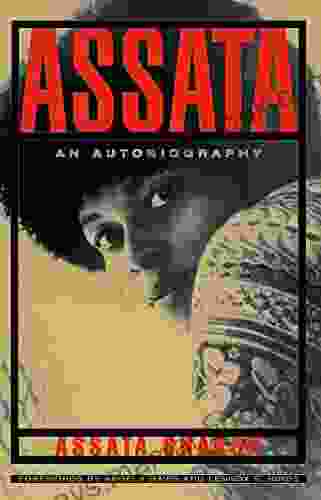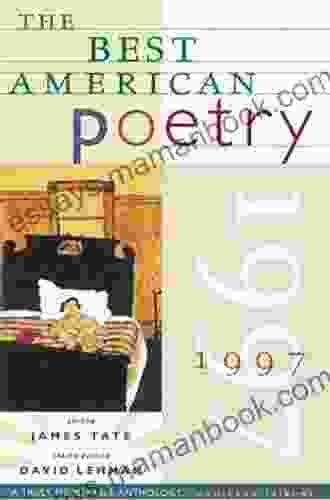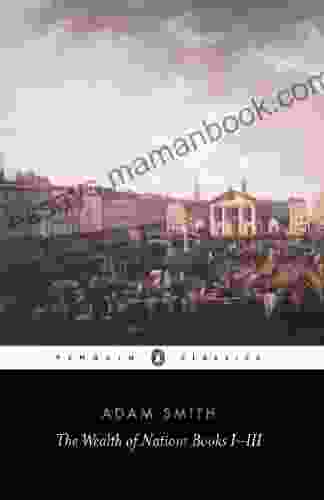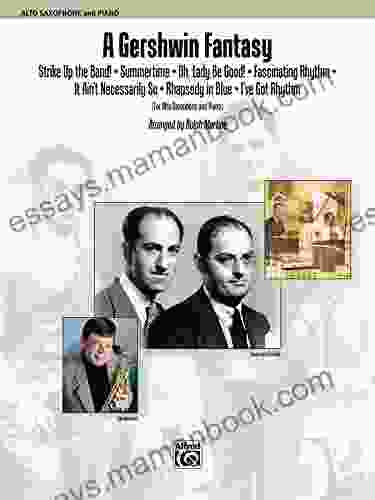An Exploration of Adam Smith's "The Wealth of Nations": Book III

Published in 1776, Adam Smith's "The Wealth of Nations" is widely regarded as the foundational text of modern economics. Divided into five books, the work encompasses a comprehensive analysis of the principles of political economy, including the nature and sources of wealth, the role of government, and the determinants of economic growth.
This article focuses on Book III of "The Wealth of Nations," which examines the distribution of income among different societal classes. Smith's groundbreaking ideas on wages, rent, and profit have had a profound impact on economic thought and continue to shape policy debates today.
4.7 out of 5
| Language | : | English |
| File size | : | 2016 KB |
| Text-to-Speech | : | Enabled |
| Screen Reader | : | Supported |
| Enhanced typesetting | : | Enabled |
| Word Wise | : | Enabled |
| Print length | : | 580 pages |
Key Concepts in Book III
Wages: Smith argued that wages are determined by the forces of supply and demand in the labor market. He distinguished between the natural price of labor (the minimum subsistence level necessary for survival) and the market price of labor (the actual amount paid to workers),which can fluctuate based on the balance of supply and demand.
Rent: According to Smith, rent is the payment made for the use of land and other natural resources, such as minerals or water. He proposed that rent is determined by the scarcity and productivity of the resource, as well as the demand for its use.
Profit: Smith viewed profit as the return to capital investment. He argued that profits are subject to diminishing returns, as the supply of capital increases and the rate of profit tends to fall over time.
Classes of Society: Smith identified three broad classes of society based on their economic roles: landowners (rent recipients),capitalists (profit recipients),and laborers (wage earners). He argued that the distribution of income among these classes is a key determinant of economic well-being.
Historical Context and Influence
Book III of "The Wealth of Nations" was written during a period of significant economic and social transformation in Europe. The Industrial Revolution was beginning to reshape labor markets and production methods, while the rise of capitalism challenged traditional feudal structures.
Smith's ideas on distribution had a profound impact on economic thought. His emphasis on the role of market forces in determining wages and profits helped to establish the foundation of classical economics. His analysis of class relations and the distribution of income became a major focus of subsequent economic research.
Implications for Economic Policy
Book III of "The Wealth of Nations" continues to inform economic policy debates today. Smith's ideas have been used to justify a range of policies, including:
- Minimum wage laws: Smith's analysis of wages has been invoked to support policies that set a minimum level of compensation to ensure that workers receive a living wage.
- Land reform: Smith's theory of rent has been used to justify policies aimed at reducing the concentration of land ownership and improving access to land for the poor.
- Capital investment incentives: Smith's emphasis on the importance of capital investment for economic growth has been used to support policies that provide incentives for businesses to invest in new equipment and technologies.
Critiques and Limitations
While Book III of "The Wealth of Nations" has been highly influential, it has also been subject to critiques and limitations:
- Simplification of class structure: Smith's identification of three distinct classes of society has been criticized as overly simplistic and ignoring the complexities of real-world income distribution.
- Incomplete treatment of labor market dynamics: Smith's analysis of wages focused primarily on the short-term forces of demand and supply, neglecting factors such as human capital and technological change that can influence wages over the long term.
- Lack of empirical evidence: Smith's theories were primarily based on observation and logical reasoning rather than systematic empirical analysis, which has led to some questioning the validity of his s.
Book III of Adam Smith's "The Wealth of Nations" remains a foundational text in economics. Its analysis of wages, rent, and profit provides fundamental insights into the distribution of income among societal classes and has had a lasting impact on economic thought and policy.
While some aspects of Book III have been revised and refined by subsequent economic research, its central ideas continue to shape our understanding of how economic systems function and how we can design policies to promote economic well-being.
4.7 out of 5
| Language | : | English |
| File size | : | 2016 KB |
| Text-to-Speech | : | Enabled |
| Screen Reader | : | Supported |
| Enhanced typesetting | : | Enabled |
| Word Wise | : | Enabled |
| Print length | : | 580 pages |
Do you want to contribute by writing guest posts on this blog?
Please contact us and send us a resume of previous articles that you have written.
 Top Book
Top Book Novel
Novel Fiction
Fiction Nonfiction
Nonfiction Literature
Literature Paperback
Paperback Hardcover
Hardcover E-book
E-book Audiobook
Audiobook Bestseller
Bestseller Classic
Classic Mystery
Mystery Thriller
Thriller Romance
Romance Fantasy
Fantasy Science Fiction
Science Fiction Biography
Biography Memoir
Memoir Autobiography
Autobiography Poetry
Poetry Drama
Drama Historical Fiction
Historical Fiction Self-help
Self-help Young Adult
Young Adult Childrens Books
Childrens Books Graphic Novel
Graphic Novel Anthology
Anthology Series
Series Encyclopedia
Encyclopedia Reference
Reference Guidebook
Guidebook Textbook
Textbook Workbook
Workbook Journal
Journal Diary
Diary Manuscript
Manuscript Folio
Folio Pulp Fiction
Pulp Fiction Short Stories
Short Stories Fairy Tales
Fairy Tales Fables
Fables Mythology
Mythology Philosophy
Philosophy Religion
Religion Spirituality
Spirituality Essays
Essays Critique
Critique Commentary
Commentary Glossary
Glossary Bibliography
Bibliography Index
Index Table of Contents
Table of Contents Preface
Preface Introduction
Introduction Foreword
Foreword Afterword
Afterword Appendices
Appendices Annotations
Annotations Footnotes
Footnotes Epilogue
Epilogue Prologue
Prologue Adrian Ernesto Cepeda
Adrian Ernesto Cepeda John Mcdonnell
John Mcdonnell Dan Jurgens
Dan Jurgens Adrian Bethune
Adrian Bethune Cathy O Brien
Cathy O Brien Leah Williams
Leah Williams Pablo Neruda
Pablo Neruda Ralph Waldo Trine
Ralph Waldo Trine Anu Lal
Anu Lal Addicted 2 The Hook
Addicted 2 The Hook Ilze Alberts
Ilze Alberts Tabor Evans
Tabor Evans Peter Afflerbach
Peter Afflerbach Sara Mcclure
Sara Mcclure Wendy Jo Peterson
Wendy Jo Peterson Reily Garrett
Reily Garrett Tunde Oyeneyin
Tunde Oyeneyin Russell Madden
Russell Madden James Scott Bell
James Scott Bell Frank Watson
Frank Watson
Light bulbAdvertise smarter! Our strategic ad space ensures maximum exposure. Reserve your spot today!

 Christian CarterAssata: An Autobiography by Assata Shakur: A Journey of Resistance, Exile,...
Christian CarterAssata: An Autobiography by Assata Shakur: A Journey of Resistance, Exile,... Albert ReedFollow ·12.2k
Albert ReedFollow ·12.2k Edwin CoxFollow ·16.4k
Edwin CoxFollow ·16.4k Johnny TurnerFollow ·4.5k
Johnny TurnerFollow ·4.5k Logan CoxFollow ·4.5k
Logan CoxFollow ·4.5k James HayesFollow ·15.6k
James HayesFollow ·15.6k Italo CalvinoFollow ·2.3k
Italo CalvinoFollow ·2.3k Timothy WardFollow ·7.1k
Timothy WardFollow ·7.1k Dakota PowellFollow ·19k
Dakota PowellFollow ·19k

 Dean Butler
Dean ButlerBlack Widow 2024: A Comprehensive Guide to Kelly...
In 2024, Marvel...

 Gage Hayes
Gage HayesNothing and the Speck: An In-Depth Analysis of Yana...
Yana Toboso's works, particularly the manga...

 Stan Ward
Stan WardThe Best American Poetry 1997: James Tate
The Best American Poetry...

 Corey Green
Corey GreenThe Chance of Home: Exploring the Poetic Landscape of...
Immerse yourself in the evocative world of...
4.7 out of 5
| Language | : | English |
| File size | : | 2016 KB |
| Text-to-Speech | : | Enabled |
| Screen Reader | : | Supported |
| Enhanced typesetting | : | Enabled |
| Word Wise | : | Enabled |
| Print length | : | 580 pages |














